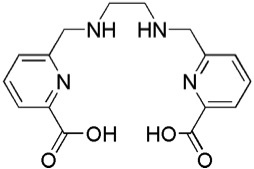
Coordination Chemistry of Metallic Isotopes in Nuclear Medicine
Our group works together with Dr. M. J. Adam, Head of PET Chemistry at TRIUMF, and with the Canadian isotope supplier Nordion to add value to their growing line of nuclear medicine radiometals. Positron emission tomography (PET) and single photon emission computed tomography (SPECT) are two imaging modalities that our aging population will depend upon for the early detection of disease, particularly in the area of oncology. PET has become a "gold standard" in the early detection of cancer, relying currently on the use of 18-fluoro-deoxy-glucose (18-FDG).

New promising radiopharmaceuticals, more specific for disease processes, are being developed for both PET and SPECT. In order to achieve this goal, new radiolabelling methods and chemistry are being discovered. Much of this advancement is made possible by the synthetic production of biomolecules (e.g. peptides, lipids, oligosaccharides, oligonucleotides and antibodies) with specific and high affinity for cancer biomarkers. The development of these ligands into viable imaging agents is being realized through the discovery of new robust, reproducible, high-yielding and rapid methods for introducing the radioisotope of choice into these biomolecules to give chemically stable entities, with a particular focus on conjugating Ga-68, In-111, and other lanthanide radionuclides into biological molecules such as peptides, proteins, oligonucleotides, carbohydrates and fatty acids and to evaluate their biological properties as potential imaging or therapy agents.